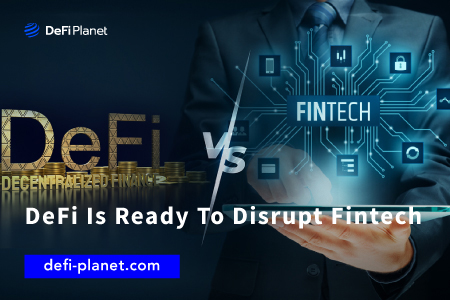Last updated on November 17th, 2022 at 02:14 pm
Over the last few years, the DeFi or decentralized finance ecosystem has seen a meteoric rise. Currently, there’s over $90 Billion in Total Valued Locked (TVL) across different DeFi protocols, and the space continues to grow at a tremendous pace.
DeFi is recreating financial products and services by replicating the traditional products we all know from TradFi onto the decentralized blockchain infrastructure. With millions of users now availing of services in the DeFi ecosystem, DeFi is eating TradFi and continues to improve on the inefficiencies of the traditional infrastructure.
You must be wondering, wasn’t FinTech the revolutionizing technology touted as the innovators in the financial sector?
FinTech was deemed the technology that we all needed for the financial infrastructure to become more efficient. However, things have not moved as planned, and FinTech companies have fallen behind in DeFi applications or DApps. It’s fair to say that from disruptors, FinTech companies have now become late movers in the space and have struggled to keep up with the rise of DeFi.
This article will talk about DeFi and FinTech, the differences between them, and how DeFi can impact FinTech. Moreover, we will also talk about why we believe FinTech can help DeFi achieve mass adoption in the future.
Let’s dive in!
What Is DeFi?
DeFi is more than just a buzzword today; it’s the future of finance. Based on public blockchains, DeFi uses smart contracts to build permissionless applications, open and accessible by anyone from anywhere in the world.
With the power of blockchain and the programmability of smart contracts, DApps allow users to lend, borrow, trade, and manage their funds without the involvement of any intermediaries. Moreover, since no central authority manages operations on a DApp, DeFi can provide these services at a much faster rate and at a much lower cost than TradFi services.
What is FinTech?
FinTech stands for Financial Technology. These companies attempt to innovate in the financial sector using modern technological advancements to make processes more efficient through automation.
Built on the existing financial system, many believed FinTech to disrupt the finance industry just like DeFi is doing today. However, in reality, the innovation FinTech has introduced to the space is limited to the sleep apps, easy-to-use UI, and improved UX compared to the legacy financial experience.
Difference Between DeFi And FinTech
To understand the difference between DeFi and FinTech, we have to look at the core principles. By basic definition, the two have significant conceptual overlap and are essentially built to innovate TradFi. However, the difference lies in how both attempt to do so.
If there had to be TLDR for the difference between DeFi and FinTech, it would be — DeFi is what FinTech aspired to be but could never become because it didn’t follow the rule book. Allow me to explain:
FinTech has disrupted the distribution of financial services, whereas DeFi aims to revolutionize the underlying infrastructure itself.
For instance, imagine you want a glow-up and make yourself look even better. What’s a better solution?
- Applying makeup or getting a facelift done.
- Improving your lifestyle by eating healthy and exercising regularly.
Sure, option A will get the job done, but it’ll do so only in the short term and does not give you what you’re looking for. At the same time, option B will help you improve overall and have a more sustainable and long-lasting effect.
While finance and beautification aren’t two topics often discussed in the same breath, this analogy works here.
FinTech has improved the legacy of financial services by automating some processes and providing sleek apps that offer a better user experience. But, it does not solve the most significant problems within the traditional finance infrastructure; this is where DeFi comes in. DeFi goes to the grassroots of financial service offerings and creates improved financial inclusion by offering an open and permissionless infrastructure that is powered by blockchain. Thus, DeFi creates a more efficient and entirely new system rather than changing the existing system with incremental improvements.
Let’s try to understand the difference between how FinTech improves TradFi and how DeFi improves TradFi with a real-world example.
For instance, let’s say that you want to take a loan. You have 3 ways to do that:
- TradFi – You will need to go to a bank where a bank employee will evaluate whether you qualify for taking this loan or not. This process usually takes time as the bank evaluates your credit history, bank account details, and future income prospects. This is quite time-consuming and tiresome as it has many different steps involved.
- FinTech – By providing an app to do all the functions mentioned above, FinTech simplifies the entire process. While you still need to have a bank account with the service provider to get a loan and provide them with your credit history, the functionality provided by the app enables you to avoid having to go to the bank and get the loan physically. Hence, the infrastructure remains the same, but you get to experience a better service offering as a user.
- DeFi – DeFi completely changes everything when it comes to availing the bank’s services to take a loan. This is because DeFi removes the intermediaries involved in the process, i.e., the bank, and thus a borrower does not require TradFi or FinTech solutions to take a loan. In DeFi, any market participant looking to lend his assets can provide the borrower with the loan, and the terms and conditions can be set between the two parties as per the requirements.
How DeFi Can Impact FinTech
With the emergence of DeFi, FinTech’s main competitor has now shifted from TradFi to DeFi. By disrupting the supply and distribution of money, DeFi enables users to do what FinTech fundamentally cannot.
While FinTech offers users a better experience of availing themselves of the traditional financial services, it is fair to say that it has failed to achieve what it was essentially set out to do – revolutionize the financial infrastructure. This is mainly because FinTech companies such as PayPal, Robinhood, etc., are fundamentally not designed to change how financial institutions work and cannot remove the barriers and constraints of the legacy system.
Moreover, FinTech does not solve one of the main issues of the current financial system, which is its inaccessibility to the larger population. For instance, despite Nigeria being the largest economy in Africa, a FinTech giant like PayPal does not allow users to receive money using a personal PayPal account and asks them to open a business account if they wish to receive funds online. In contrast, since DeFi is permissionless and open, it can bank the unbanked as anyone can access the DeFi ecosystem.
Thus, it can be said that DeFi can impact FinTech because of the following reasons:
- Improved Financial Inclusion – DeFi removes all the barriers to entry for financial services
- Improved infrastructure – By using blockchain and smart contracts, DeFi can provide a better infrastructure for financial services.
- Reduced Costs – By removing intermediaries and automating mundane processes, DeFi can cut down on costs and make financial services more affordable for users.
Why DeFi Needs FinTech
While DeFi does offer many benefits over and above what FinTech has to offer, there’s a lot it can learn from its counterpart when it comes to usability. For DeFi to gain mass adoption, it needs FinTech to improve upon the following:
- Improved UI/UX – Many users find it technically challenging to use DeFi services and, as a result, end up never using the platforms.
- Lack of knowledge – As a DeFi degen, it’s common to think about Ether and pay gas fees for transactions. But, this can be very complicated for new users as they are used to making transactions with fiat.
- No customer service – While DeFi is built to empower users and get things done on their own, the general market participant in TradFi is used to having customer service support at all times. This gives them the required assistance and the assurance that someone is there to help them.
Thus, DeFi needs FinTech to improve on the points mentioned above that currently hinder DeFi’s mass adoption.
In Conclusion…
- DeFi is innovative and has tremendous potential to disrupt TradFi and FinTech. By empowering the market participants and removing the intermediaries, DeFi proposes to change the legacy financial infrastructure for good. However, there’s still a long way to go before we can think about DeFi becoming mainstream, and as mentioned above, DeFi can use FinTech to improve its service offerings.
So, what are your views on DeFi? Do you believe it’s the future of finance?
Comment below and let us know more!
If you would like to read more articles like this, follow DeFi Planet on Twitter and LinkedIn.





















